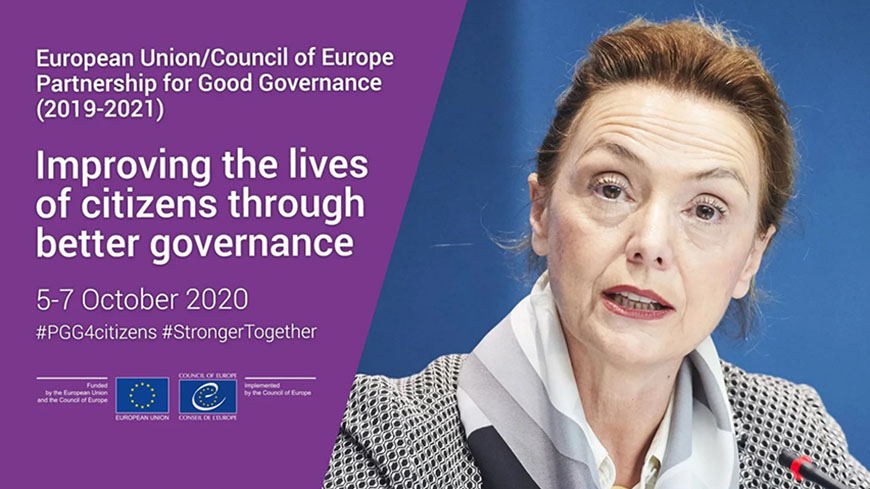A PGG online event to reflect on the mid-term results of the second phase of the European Union and Council of Europe Partnership for Good Governance (PGG), launched in 2019 for the Eastern Partnership region, took place from 5-7 October 2020 under the title ‘Improving the lives of citizens through better Governance’.
“The Partnership for Good Governance has continued to deliver for citizens of the Eastern Partnership countries - even in these difficult times,” said Marija Pejčinović Burić, Secretary General of the Council of Europe, in her welcome address. “We have worked together with the European Union and Eastern Partnership countries to pursue this unique, multi-topic, multi-year, multi-country programme that helps bring national legislation and practice into closer alignment with European standards and strengthens the capacity of national authorities to implement domestic reforms”.
In his welcome address, Oliver Varhelyi, the European Commissioner for Neighbourhood and Enlargement, underlined that without democracy, long-term development and economic prosperity cannot exist, nor can peace and stability. He stressed that the PGG was fundamental in achieving results in the priority areas of strengthening democratic institutions in the EU partner countries.
The second phase of the programme working on fighting economic crime, better justice for citizens, combating violence against women and protection against discrimination, was underpinned by a 17.5 million Euro budget, 80% financed by the EU and 20% by the Council of Europe. The programme’s work contributes strongly to the implementation of both the Council of Europe’s Action Plans for Eastern Partnership countries and the EU’s 2020 goals.
The live session on 5 October ““Eastern Partnership: challenges and priorities for future cooperation” featured high-level representatives of the European Union, the Council of Europe, representatives of the authorities, agencies and legal community of the Eastern Partnership countries. On 7 October, a live panel “Responses to COVID 19 and lessons learned in the Eastern Partnership region” was held.
Between the live sessions, from 5 to 7 October, interviews/statements by representatives of the European Union and the Council of Europe, testimonies from beneficiaries and partners from the Eastern Partnership countries, quizzes, videos, as well as other information materials on the results of PGG in the priority areas (fighting economic crime, better justice for citizens, combating violence against women, protection against discrimination) will be posted on the dedicated section of the website. In the framework of the event, a photo competition on the theme of anti-discrimination will be announced; and an online “suggestion box” on proposals for the future of the Eastern Partnership will be launched.





